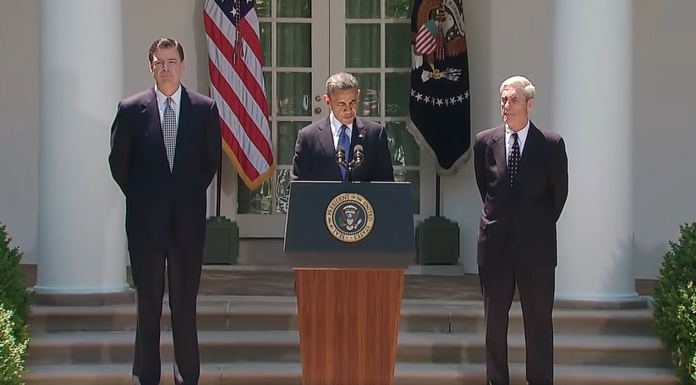(Eli Pacheco, Headline USA) An executive order signed just weeks before the end of former President Barack Obama’s regime allowed seditious deep-state operatives to continue spying on political enemies in incoming President Donald Trump’s administration, according to a report from the Epoch Times.
Section 2.3 of Executive Order 12333, outlining “Procedures for the Availability or Dissemination of Raw Signals Intelligence Information by the NSA” grants the highly secretive agency easy access to raw data on individuals—especially those on Donald Trump’s transition team—and also authorizes the NSA to share the unfiltered data with individuals or agencies that request it.
Obama signed the order on Jan. 3, 2017—two days before a notorious meeting in which he and his top intelligence heads met to brainstorm their plan for framing Trump and incoming national security adviser Michael Flynn as part of the FBI’s ongoing “Crossfire Hurricane” operation.
Evidence has shown that the top intelligence heads knew at the time that the allegations of Russian collusion against Trump had been cooked up by the Hillary Clinton campaign.
One of the ways they were able to frame Flynn was by illegally unmasking his name on intercepted phone calls with a Russian diplomat and then leaking the information to the Washington Post to make it appear as though Flynn was guilty of the archaic Logan Act. FBI agents then used the transcript of his conversation to ensnare Flynn in a deliberate perjury trap during a voluntary interview, which they had arranged under false pretenses.
Despite the fact that Obama had been harshly criticized for allowing the NSA to surreptitiously spy on private citizens following the bombshell revelations from whistleblower Edward Snowden, the last-minute order further loosened the data and privacy restrictions under which the NSA had worked.
American wiretap laws don’t offer much regulation for government surveillance anyway. Data subject to sharing without privacy restrictions include:
- Messages between people abroad that cross domestic network switches
- Phone calls and emails that cross network switches abroad
- Satellite transmissions
The order allowed individuals and agencies to request NSA surveillance information—without names or personal data protected—on anyone. The requester needed only to state that the data is critical to a particular mission.
The final order included an added provision titled “Political process in the United States,” part of which prevents disseminating information to the White House.
This left Obama’s regime unaffected but began just before Trump’s presidency. It allowed greater sharing between agencies than during Obama’s term, giving the Left access to names and information on anyone serving on Trump’s transition team.
In July 2017, Devin Nunes, then chairman of the House Intelligence Committee, addressed the onslaught of data leaks. He also suggested legislation to combat the problem in a letter to Dan Coates, the Director of National Intelligence.
In his letter, Nunes said: “We have found evidence of current and former government officials had easy access to U.S. person information, and it is possible that these officials used this information to achieve partisan political purposes, including the selective, anonymous leaking of such information.”
Nunes mentioned someone in the Obama administration who made hundreds of data requests. Further, many requests centered around unmasking officials involved in the Trump presidential transition. Because no official reason accompanied the request, Nunes concluded the data were for “improper purposes,” including leaking.
Predictably, leaks involving those unmasked individuals surfaced after the requests.
“Details about persons associated with the [Trump] administration, details with little apparent foreign intelligence value were widely disseminated in intelligence community reporting,” Nunes said in one of several news conferences regarding the order.
Evelyn Farkas, the former deputy assistant secretary of Defense under Obama, detailed the administration’s efforts. In a 2017 interview on MSNBC’s Morning Joe.
Farkas said the administration wanted to get as much data on Trump, specifically about alleged communications with Russia regarding the presidential election, and his team as soon as possible before Obama left office.
“If the Trump folks found out how we knew what we knew about the Trump staff’s dealings with Russians, that they would try to compromise those sources and methods,” Farkas said in the interview. “We would no longer have access to that intelligence. … We have very good intelligence on Russia.”

